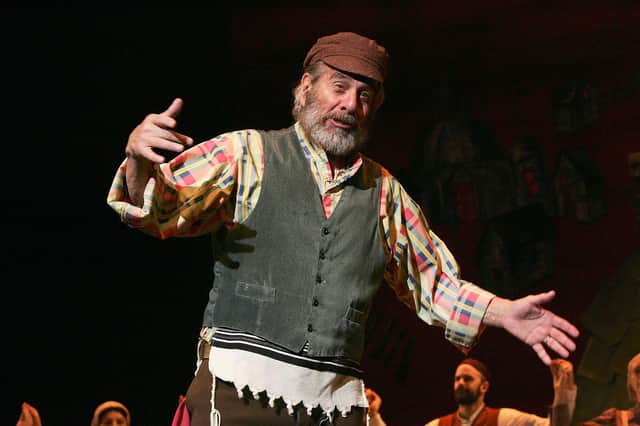Edinburgh International Festival: Pianist's awe-inspiring performance made me realise the pain of a year without music – Professor Joe Goldblatt


The melodious sound, while familiar, at first appeared almost unintelligible. In order to better understand this strange and also beautiful vocabulary, I suddenly leaned forward in my chair and was rewarded with Brahms performed by Elena Fischer-Dieskau, a brilliant member of the keyboard faculty at St Mary’s Music School.
We were attending a ‘test event’ conducted at the University of Edinburgh’s Old College in a new marquee created by the Edinburgh International Festival to explore how an outdoor concert hall might serve as a new summer home for us and many others in the future. If the smiles and bravos from the audience are any indication, this home may become the new normal for thousands of concert goers every summer.
Advertisement
Hide AdAdvertisement
Hide AdMy reaction to the first musical notes rising from the grand piano and gently floating up and out to my chair reminded me of a distant memory of nearly 60 years ago. My father returned home from his small hardware store and proudly waved in front of my mother, sister and myself, four front-row tickets for a musical about Jewish family life entitled Fiddler on the Roof.
I glanced at the price for each ticket and was surprised because Papa, a child during the USA’s great depression had been so poor that at one time he lived in a tent with his parents and seven brothers and sisters. I immediately realised that Papa, a proud Jew, believed that this performance was worth his hard-earned treasure.
We entered the music hall and proudly walked down the centre aisle to the front row and as we took our seats the lights dimmed and an actor walked onto the stage and began singing the opening number, Tradition. This song describes the traditions of the Jewish people that have sustained them for thousands of years despite constant persecution. Papa reached over and squeezed my small hand and I looked up at him and noticed he was quietly crying. He pointed to the stage and whispered to me: “That is my family.”
The organic connection between audience and performer as demonstrated by Papa’s long-ago response is something that I have valued throughout my entire life. Perhaps that is why this past year, one without live music, theatre, or dance has been so painful. Ironically, I did not recognise this real, deep pain until the first notes were played.
During the past year, I also have come to realise how precarious and fragile the arts are in our modern and increasingly digitally dominated world.
Performing arts organisations were the first enterprises to shut their doors and the last to re-open. This demonstrates to me the lower level of value that they are considered by our policymakers, civil servants and politicians. Although most citizens greatly value safety and security, healthcare and education, each of these societal foundations is also dependent upon citizens appreciating the aesthetic, the ability to imagine and invent, and think. And this is why, I never again want to feel that pain again.
In the first line of his best-selling book, Antifragile: Things That Gain from Disorder, Nassim Nicholas Talib writes: “Some things benefit from shocks; they thrive and grow when exposed to volatility, randomness, disorder, and stressors and love uncertainty. Yet, in spite of the ubiquity of the phenomenon of antifragile, there is no word for the exact opposite of fragile. Antifragility is beyond resilience or robustness. The resilient resists shocks and stays the same; the antifragile gets better.”
We have just experienced a time of great shock and now we must develop the tools, techniques and resolve to embrace antifragility or risk losing the cultural soul of Edinburgh and the country.
Advertisement
Hide AdAdvertisement
Hide AdAccording to Talib, if we embrace antifragility as a way to become stronger, with every shock we experience we may be able to protect, preserve and even grow what was once considered fragile in the past.
One way me may become stronger and more antifragile is through continuing to experiment with new live venues, just as the Edinburgh International Festival is doing this summer. If we fail to develop this antifragility, we risk the music being silenced and we cannot afford another year, month, day or even minute without live music to illuminate our lives.
During the final movement of the music, the rain began to beat heavily upon roof of the marquee and the musician closed her eyes, lifted her head and continued to perform as if she was coaxing tears from heaven above. The sound of the pounding rain competed against the notes from the piano and I am happy to report that the music over and over again won the day.
As I rose from my chair to join others in loudly applauding and shouting bravo as the performer took her final bow, I looked lovingly upon the new outdoor concert stage and thought, Papa was right, that is indeed my family and I must now take better care of it for future generations.
As the audience departed the marquee, the sun triumphantly burst through the clouds and I silently thought that the Edinburgh International Festival, through this new venue, was in fact ushering in a new era, even a bright sunrise, and now we must all work even harder to sustain this radiance for future generations.
Joe Goldblatt is emeritus professor of planned events at Queen Margaret University and to learn more about his views about the Edinburgh Festivals and other subjects visit www.joegoldblatt.scot
A message from the Editor:
Thank you for reading this article. We're more reliant on your support than ever as the shift in consumer habits brought about by coronavirus impacts our advertisers.
If you haven't already, please consider supporting our trusted, fact-checked journalism by taking out a digital subscription.
Comments
Want to join the conversation? Please or to comment on this article.
